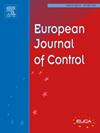Invariant properties of linear-iterative distributed averaging algorithms and application to error detection
IF 2.5
3区 计算机科学
Q2 AUTOMATION & CONTROL SYSTEMS
引用次数: 0
Abstract
We consider the problem of average consensus in a distributed system comprising a set of nodes that can exchange information among themselves. We focus on a class of algorithms for solving such a problem whereby each node maintains a state and updates it iteratively as a linear combination of the states maintained by its in-neighbors, i.e., nodes from which it receives information directly. Averaging algorithms within this class can be thought of as discrete-time linear time-varying systems without external driving inputs and whose state matrix is column stochastic. As a result, the algorithms exhibit a global invariance property in that the sum of the state variables remains constant at all times. In this paper, we report on another invariance property for the aforementioned class of averaging algorithms. This property is local to each node and reflects the conservation of certain quantities capturing an aggregate of all the values received by a node from its in-neighbors and all the values sent by said node to its out-neighbors (i.e., nodes to which it sends information directly) throughout the execution of the averaging algorithm. We show how this newly-discovered invariant can be leveraged for detecting errors while executing the averaging algorithm.
线性迭代分布式平均算法的不变特性及其在误差检测中的应用
我们考虑的是由一组可以相互交换信息的节点组成的分布式系统中的平均共识问题。我们将重点放在一类解决此类问题的算法上,在这类算法中,每个节点都保持一个状态,并将其更新为其邻近节点(即直接从其接收信息的节点)所保持状态的线性组合。这类算法中的平均算法可以看作是离散时间线性时变系统,没有外部驱动输入,其状态矩阵是列随机的。因此,这些算法具有全局不变性,即状态变量之和在任何时候都保持不变。在本文中,我们将报告上述平均算法的另一个不变性。这一特性是每个节点的局部特性,它反映了某些量的守恒性,即在平均算法的整个执行过程中,一个节点从其内邻节点接收到的所有值的总和,以及该节点向其外邻节点(即它直接向其发送信息的节点)发送的所有值的总和。我们将展示如何在执行平均算法时利用这一新发现的不变量来检测错误。
本文章由计算机程序翻译,如有差异,请以英文原文为准。
求助全文
约1分钟内获得全文
求助全文
来源期刊

European Journal of Control
工程技术-自动化与控制系统
CiteScore
5.80
自引率
5.90%
发文量
131
审稿时长
1 months
期刊介绍:
The European Control Association (EUCA) has among its objectives to promote the development of the discipline. Apart from the European Control Conferences, the European Journal of Control is the Association''s main channel for the dissemination of important contributions in the field.
The aim of the Journal is to publish high quality papers on the theory and practice of control and systems engineering.
The scope of the Journal will be wide and cover all aspects of the discipline including methodologies, techniques and applications.
Research in control and systems engineering is necessary to develop new concepts and tools which enhance our understanding and improve our ability to design and implement high performance control systems. Submitted papers should stress the practical motivations and relevance of their results.
The design and implementation of a successful control system requires the use of a range of techniques:
Modelling
Robustness Analysis
Identification
Optimization
Control Law Design
Numerical analysis
Fault Detection, and so on.
 求助内容:
求助内容: 应助结果提醒方式:
应助结果提醒方式:


